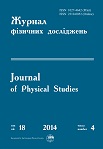DOI: https://doi.org/10.30970/jps.22.1001
THE MOTION OF A PARTICLE IN A GRAVITATIONAL FIELD IN A ROTATIONALLY-INVARIANT NONCOMMUTATIVE SPACE OF A CANONICAL TYPE AND THE WEAK EQUIVALENCE PRINCIPLE
Kh. P. Gnatenko, O. O. Morozko, Yu. S. Krynytskyi
Department for Theoretical Physics, Ivan Franko National University of Lviv,
12, Drahomanov St., Lviv, 79005, Ukraine
